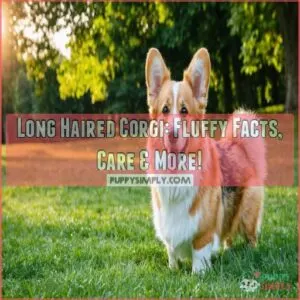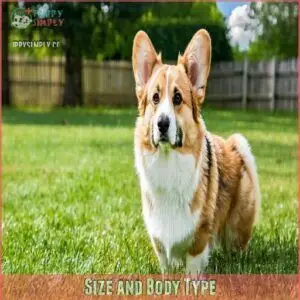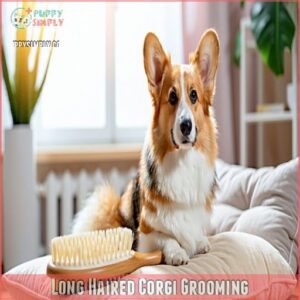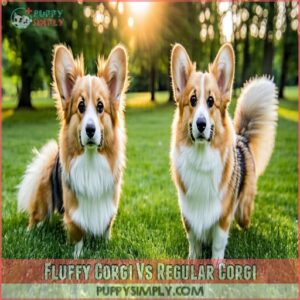This site is supported by our readers. We may earn a commission, at no cost to you, if you purchase through links.
 You’re likely here because you’ve heard whispers of the majestic long haired corgi, a fluffier cloud of corgi goodness.
You’re likely here because you’ve heard whispers of the majestic long haired corgi, a fluffier cloud of corgi goodness.
These aren’t a separate breed, but rather Pembroke or Cardigan Welsh corgis with a recessive "fluff" gene.
Think all the classic corgi charm—short legs, long body, herding instincts—wrapped in a luxurious, thick coat.
This double coat comes in various colors and markings, just like their short-haired counterparts.
While undeniably adorable, that extra fluff means more grooming.
Curious about health, temperament, or finding a reputable breeder? There’s a whole lot more to this fluffy tale.
Table Of Contents
- Key Takeaways
- What is Long Haired Corgi
- Fluffy Corgi Appearance
- Corgi Care and Health
- Fluffy Corgi Temperament
- Long Haired Corgi Grooming
- Getting a Fluffy Corgi
- Fluffy Corgi Vs Regular Corgi
- Frequently Asked Questions (FAQs)
- What are long haired corgis called?
- How much do long-haired corgis cost?
- Why are Pembroke Welsh Corgis so expensive?
- Are there two types of corgis?
- How much does a Fluffy Corgi cost?
- What colors do Fluffy Corgis come in?
- Is it difficult to find a Fluffy Corgi for sale or adoption?
- Are Fluffy Corgis generally healthier than regular Corgis?
- How often should a Fluffy Corgi be groomed?
- Are Fluffy Corgis hypoallergenic?
- Conclusion
Key Takeaways
- Long-haired Corgis, or "Fluffy Corgis," aren’t a separate breed but Pembroke or Cardigan Welsh Corgis with a recessive fluff gene that gives them a longer, thicker coat.
- They need frequent grooming, like brushing 3-4 times a week, to manage heavy shedding, prevent matting, and keep their luxurious double coat healthy.
- Fluffy Corgis share the same health risks as regular Corgis, including hip dysplasia and vision issues, so regular vet care and a balanced diet are crucial.
- These dogs are loyal, playful, and energetic, but their herding instincts and barking tendencies require early training and socialization for a well-rounded companion.
What is Long Haired Corgi
Ever wondered about those extra-fluffy Corgis you’ve seen online?
They’re not a separate breed, but a variation of the Pembroke or Cardigan Welsh Corgi, thanks to a recessive "fluff" gene that gives them a longer, thicker coat.
Fluffy Corgi Characteristics
Fluffy Corgis, those rare variants with the cloud-like coats, inherit their fluff from a recessive gene quirk.
This affects their corgi coat types, making them the "long haired corgi" everyone’s talking about.
Beyond the fluff, these fluffy corgi puppies share standard corgi characteristics, like dwarfism effects and that undeniable herding instinct.
Their coat genetics create a plush, double coat, setting them apart.
For more information on corgi breeds, to gain a full understanding, one must consider the historical context and unique traits of these dogs.
Corgi Origins and History
Corgi history is as rich as their fluffy coats.
With Viking influence and an ancient root in Welsh heritage, Pembroke and Cardigan Welsh Corgis have fascinating tales.
The Flemish connection? Likely, Flemish weavers contributed to their ancestry.
These corgi breeds carry a genetic legacy tied to herding, loyalty, and even legend, where Welsh corgis were fairy mounts.
Their origin stories? Unforgettable tales worth sharing.
The breed’s Corgi history is a tribute to their enduring presence in human society, tied to their ancient root and legend.
Pembroke and Cardigan Welsh Corgis
So, you’re curious about Corgi breeds, eh?
Let’s sniff into the Pembroke and Cardigan Welsh Corgis.
These two pups, despite their shared Welsh roots, boast some key differences.
Think of it like this:
- Pembroke Welsh Corgis: Often tailless, these charmers are known for their playful Corgi behavior and smarts (Dog Intelligence!).
- Cardigan Welsh Corgis: Sporting a full tail, they showcase a slightly larger frame and a stronger Herding Instinct.
Understanding pembroke welsh corgi characteristics is essential to appreciate their unique traits.
- Both: These fluffy Corgi and long haired Corgi variations inherit the breed’s signature low-slung build and love for a good romp.
Each breed variation adds to the Corgi charm!
Fluffy Corgi Appearance
You’ll quickly recognize a Fluffy Corgi by its long, thick double coat, a prominent feature that sets it apart from its short-haired counterparts.
These adorable fluffballs come in a variety of colors and markings, similar to the standard Pembroke and Cardigan breeds, but let’s explore the specifics of their size and body type, particularly focusing on the double coat.
Double Coat Features
Beyond the "Fluffy Corgi" label lies a luxurious double coat.
This defining feature involves a thick, soft undercoat and a longer, coarser outer coat.
This coat thickness contributes to significant shedding—prepare for fur tumbleweeds!
Regular corgi grooming is key to managing shedding patterns and preventing undercoat issues, matting problems, and that dreaded "long coat corgi" frizz.
Long haired corgi owners know, corgi shedding and corgi coat care go hand-in-paw.
Color Variations and Markings
Fluffy Corgis come in an array of coat patterns and colors, from classic red and sable to striking blue merle in long haired Cardigan Corgis.
Color genetics add variety, with white markings often accenting fur texture beautifully.
While breed standards favor short coats, long haired Corgi puppies proudly flaunt their unique looks, and Corgi coat care is key to keeping their stunning markings vibrant, particularly with long haired Corgis.
Size and Body Type
Longhaired Corgis pack a lot of personality into their compact bodies.
Their body proportions are classic corgi: long torso, short leg length, and a solid muscle structure.
Thanks to dwarfism effects, these sturdy dogs stand around 10-12 inches tall and weigh 25-30 pounds, with slight weight factors depending on diet and activity.
Despite their fluff, long hair corgi dogs are anything but miniature, and with their compact bodies, they still manage to have a significant presence.
Corgi Care and Health
Taking care of a Fluffy Corgi means staying on top of their grooming, exercise, and health needs to keep them happy and thriving.
From managing their copious shedding to ensuring they stay active and avoid common health issues like hip dysplasia, you’ll find it’s all part of the fun of owning such a charming and energetic furball.
Grooming Requirements and Shedding
Keeping up with your long-haired Corgi’s fur is no small task, but it’s worth it to keep their coat looking fabulous.
Here’s how to manage corgi grooming requirements:
- Brushing Techniques: Brush 3-4 times weekly to prevent mats and control shedding.
- Mat Removal: Use detangling tools to tackle stubborn knots.
- Shedding Control: Regular brushing helps keep your home fur-free.
Investing in the right Corgi Brushes can make a significant difference in their grooming.
Consistency is key!
Common Health Issues and Life Expectancy
Caring for a long hair corgi dog means understanding its potential health risks.
Common issues include hip dysplasia, PRA, and Von Willebrand’s disease, all affecting corgi health and mobility.
Longevity factors include regular vet visits, managing diet, and exercise.
Genetic testing helps identify problems early.
Below’s a quick look at long-haired corgi health:
| Health Issue | Causes | Symptoms | Prevention | Treatment |
|---|---|---|---|---|
| Hip Dysplasia | Genetics | Limping | Weight management | Surgery or physical therapy |
| Von Willebrand’s | Genetics | Excess bleeding | Genetic testing | Medication |
| Progressive Retinal | Inherited | Vision loss | Eye exams | No cure but management with vets |
| Intervertebral Discs | Spinal strain | Weak legs | Safe exercise | Anti-inflammatory meds or surgery |
| Dental Problems | Neglect | Gum disease | Brushing, cleanings | Dental care |
Long-haired corgi owners must be aware of these potential issues to provide the best possible care, including regular vet visits and managing diet to prevent or mitigate these conditions, ensuring a healthy and happy long hair corgi.
Exercise and Training Needs
A Fluffy Corgi’s boundless energy demands daily walks and regular playtime activities.
These energetic herders thrive on structured exercise routines—think fetch or agility training.
With their sharp minds, balanced training techniques are key to managing the quirky long hair corgi personality.
Proper dog training taps into their loyal, enthusiastic dog temperament, making them delightful companions.
Keep corgi exercise fun, and you’ll both enjoy the adventure!
Fluffy Corgi Temperament
You’ll find Fluffy Corgis to be loyal and social.
Their personality is packed with amazing traits, making them amazing family companions.
Their playful energy and watchdog instincts come with a touch of stubbornness and a tendency to bark, so early training is key!
Family Dog and Watchdog Traits
Long haired corgis are all about blending family dynamics with natural watchdog skills.
Their alert, bark-first attitude makes them a fantastic early warning system, protecting your home without being overbearing.
With proper watchdog training, these corgi breeds with fluffy hair prove fiercely loyal.
Their long hair personality shines as they bond deeply with family, balancing playful charm and an intuitive sense of home security.
Socialization and Loyalty
Like other Corgi breeds, Fluffy Corgis are fiercely loyal, weaving themselves into your family’s tapestry.
Early socialization is key for these pack-oriented pups.
- Introduce your Fluffy Corgi to various sights and sounds.
- Encourage positive interactions with other dogs and people.
- Enroll in puppy classes to build social skills and canine bonding.
- Reinforce positive interactions with praise and rewards.
- Nurture those family ties and watch your Fluffy Corgi’s loyalty traits blossom.
This approach to socialization will help your Fluffy Corgi become a well-adjusted and pack-oriented companion.
Potential Barking and Herding Instincts
While Fluffy Corgis make great companions, be prepared for some barking.
It’s how these little herding dogs communicate! Those herding instincts? Yep, your long haired corgi puppy might try to "herd" your feet.
Early instinct training and noise reduction strategies can help manage these corgi breeds’ behaviors.
Long Haired Corgi Grooming
Keeping your long-haired Corgi looking great takes regular grooming, but it doesn’t have to be a chore.
With the right brush and a little patience, you’ll keep their fluffy coat tangle-free and your home fur-controlled (mostly).
Brushing and Bathing Frequency
Keeping that glorious fluff-ball coat pristine means regular brushing—at least three times a week.
Think cloud of fluff, not tumbleweed.
Bathing? Once a month is plenty, unless your corgi decides to wrestle a mud monster.
To maintain a healthy coat, using the right corgi slicker brush is key.
- Slicker brush
- Undercoat rake
- Metal comb
- Dematting tool (for emergencies!)
- Corgi-approved shampoo
Nail Trimming and Ear Cleaning
Beyond brushing, paw maintenance is key for your fluffy corgi.
Regular nail clipping prevents overgrowth and discomfort.
Don’t forget those floppy ears, ear cleaning prevents ear wax buildup and infections.
Aim for a sweet spot—not too often, not too little.
Proper nail trimming techniques are essential for preventing painful infections and promoting overall foot health.
| Why? | ||
|---|---|---|
| Nail Clipping | 2-4 weeks | Prevents overgrowth, improves gait |
| Ear Cleaning | 1-2 weeks | Prevents ear wax and infections |
| Canine Hygiene Checkup | Regularly | Early detection is best for corgi care |
Dental Care and Hygiene
Prioritize your Corgi’s pearly whites to prevent tooth decay and gum disease.
Bad breath is often the first sign of trouble.
- Brush those chompers regularly.
- Offer dental chews.
- Schedule vet cleanings.
- Watch for excessive drool.
Learn about corgi genetics and dog health concerns. A healthy mouth equals a happy Corgi! Providing the right dental care products can make a significant difference in maintaining your Corgi’s oral health.
Getting a Fluffy Corgi
If you’re set on bringing a Fluffy Corgi home, you’ll want to start by finding a reputable breeder or checking local shelters.
Be ready for a little extra grooming and care, but trust us—those adorable fluffy tails are well worth it!
Reputable Breeders and Adoption
Finding a long-haired Corgi means doing your homework.
Look for fluffy Corgi breeders who follow AKC guidelines, health-test their dogs, and welcome breeder interviews. Reputable corgi breeders will let you meet puppies and their parents, so you know what you’re getting into.
Understanding the fluffy corgi characteristics is essential for making an informed decision. Adoption’s another great route—explore rescue groups or foster care options through sites like Adopt a Pet, where the adoption process connects you with a fluffer in need.
While fluffy Corgi breeders in Canada might take some searching, every option brings a loyal buddy. Just keep breed standards and responsible practices at the top of your list.
Cost and Upkeep Considerations
Owning a long-haired Corgi isn’t just about initial cuddles—it’s also about budgeting for their care.
These fluffy companions come with ongoing costs that can add up quickly:
- Food expenses: $50-$80 monthly for quality kibble.
- Veterinary fees: Expect $100-$300 annually for routine check-ups.
- Grooming tools: Brushes and shampoos cost $30-$150 initially.
- Insurance premiums: Budget $500-$600 yearly to cover emergencies.
While hunting for "long-haired Corgis for sale" or working with fluffy Corgi breeders (like in Canada), remember upkeep is costly.
Even their tails need brushing! Happy tails, cleaner carpets—worth every penny.
Fluffy Corgi Vs Regular Corgi
You’ve probably noticed that Fluffy Corgis look like regular Corgis with an extra dose of glam, but there’s more to it than just their long, luxurious coat.
From grooming needs to breed standards, the differences come down to care, practicality, and some quirky genetics.
Key Differences and Similarities
When picking between a regular and a long-haired Corgi, it’s about looks, grooming, and personality quirks.
Fluffy coats demand extra care, while standard coats are lower maintenance. Both share charming herding traits and loyalty.
Here’s a quick breed comparison:
| Feature | Regular Corgi | Long Haired Corgi |
|---|---|---|
| Grooming Effort | Moderate | High |
| Coat Style | Short/Coarse | Plush/Feathered |
| Popularity | Recognized globally | Rare and niche |
Loyalty stays constant!
Fluff Gene and Its Effects
A fluffy corgi‘s long hair isn’t a fashion statement, it’s genetics.
The fluff gene, or FGF5 gene, is a recessive trait, meaning both parents must carry it for a long haired corgi pup.
This genetic mutation creates coat variance, impacting fluff expression but not long hair corgi dogs behavior.
| Trait | Fluffy Corgi | Regular Corgi |
|---|---|---|
| Coat Length | Long | Short |
| FGF5 Gene | Two Copies | One or Zero Copies |
| Inheritance | Recessive | Dominant |
| Behavior | No change from Regular Corgi | No change from Fluffy Corgi |
Recognition by Kennel Clubs and Breed Standards
So, you’re curious about Kennel Club rules and breed standards for your fluffy friend?
Here’s the deal: major kennel clubs like the American Kennel Club (AKC) don’t recognize longhaired Corgis–it’s a "fluff" thing.
Understanding the fluffy corgi characteristics is essential to appreciate the unique features of these dogs.
| Feature | Pembroke Welsh Corgi | Cardigan Welsh Corgi |
|---|---|---|
| AKC Standard | Short Coat | Short Coat |
| Longhair Status | Fault | Fault |
| Breed Shows | Not Allowed | Not Allowed |
| Genetic Testing | Reveals Fluff Gene | Reveals Fluff Gene |
Frequently Asked Questions (FAQs)
What are long haired corgis called?
They’re adorably known as "Fluffy Corgis"! This rare, long-coated version of the Pembroke or Cardigan Welsh Corgi comes from a recessive gene, giving them a plush, extra-huggable coat.
How much do long-haired corgis cost?
Expect to pay between $600 and $1,000 for a fluffy corgi pup. Remember, these adorable "fluffballs" often have longer breeder waitlists.
Why are Pembroke Welsh Corgis so expensive?
Owning a Pembroke Welsh Corgi doesn’t come cheap—demand outpaces supply, breeders invest in health testing, and strict AKC standards mean added costs.
Plus, their irresistible charm? Let’s face it, that’s always going to fetch a premium!
Are there two types of corgis?
Yes, there are two types of Corgis: the Pembroke Welsh Corgi and the Cardigan Welsh Corgi.
Pembrokes are tailless charmers, while Cardigans have full tails and a sturdier build.
Both are loyal, lovable companions.
How much does a Fluffy Corgi cost?
Around 25% of Corgis may carry the "fluff" gene, making Fluffy Corgis rare.
Expect to pay $1,000-$3,000 from reputable breeders.
Just don’t fall for overpriced fluff; adoption’s always a sweet, wallet-friendly option!
What colors do Fluffy Corgis come in?
Fluffy Corgis come in stunning colors like red, sable, fawn, and black and tan, often with white markings.
Their plush coats make every shade look extra luxurious.
Cardigans offer extra variety, including blue merle.
Is it difficult to find a Fluffy Corgi for sale or adoption?
Finding a Fluffy Corgi for sale or adoption isn’t easy.
They’re rare due to the recessive gene, leading to waitlists with breeders.
Adoption’s possible but less common—patience (and persistence) will be your best friend.
Are Fluffy Corgis generally healthier than regular Corgis?
Corgis, fluffy or not, share similar health profiles.
That luxurious fluff doesn’t boost immunity or cause issues.
Regular vet care, exercise, and diet matter most, focus on overall well-being, not coat type, for healthier years!
How often should a Fluffy Corgi be groomed?
You’ll want to brush your Fluffy Corgi at least three times a week to manage shedding and prevent matting.
During shedding seasons, daily brushing helps.
Regular grooming keeps their gorgeous coat tangle-free and healthy!
Are Fluffy Corgis hypoallergenic?
Imagine cuddling a Fluffy Corgi and sneezing—unfortunately, they’re not hypoallergenic.
Their thick, double coat sheds heavily, spreading dander. If allergies are a concern, grooming and cleaning regularly can help, but they’re not allergy-friendly companions.
Conclusion
Owning a long haired corgi is like having a walking cotton ball with personality.
Their luxurious coat might demand some extra grooming, but the charm and companionship they offer are unmatched.
These fluffy corgis bring all the loyalty, playfulness, and quirks you’d expect from the breed, wrapped in an extra-soft package.
Whether you’re drawn to their unique look or their lovable nature, one thing’s certain—life with a long haired corgi is endlessly rewarding.
- https://stumpsandrumps.com/fluffycorgi/
- https://www.dogster.com/dog-breeds/long-haired-corgi
- https://pawsafe.com/blogs/dog-breeds/the-long-haired-corgi
- https://www.reddit.com/r/corgi/comments/17ulxlq/anyone_know_what_kind_of_corgi_this_is_id_love_to/
- https://onlinelibrary.wiley.com/doi/10.1111/j.1365-2052.2006.01448.x

















